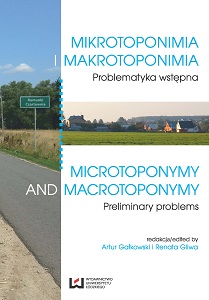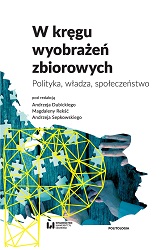
From studies of the old names of settlements in Bulgaria
Z badań nad starymi ojkonimami w Bułgarii
Keywords: names of settlements;changes in sound shape;historically conditioned changeability;semantic continuity
More...
Keywords: names of settlements;changes in sound shape;historically conditioned changeability;semantic continuity
More...
Keywords: microtoponymy;ground names
More...
Keywords: onomastics;field names;derivation;composition;prepositional phrase
More...
Keywords: image metaphor;metonymy;oronym
More...
Keywords: makrotoponym;mikrotoponym;grammar onomastic
More...
Keywords: urbanonymy;naming of housing estates;creation of housing estates
More...
Keywords: toponyms;the Great French Revolution;the October Revolution of 1917;
More...
Keywords: Chinese microtoponyms;classification of Chinese microtoponyms;Chinese landscape parks names;Chinese names of scenic spots
More...
Keywords: onimic nomination;translocation;transonimization;nomination;toponym;chrematonym
More...
Keywords: choronym (macrotoponym);microtoponym;the settlement of a dependent;toponymy in Dobrzyń area
More...
Keywords: orohodonyms (climbing-path names);microoronyms;inherent;adherent and contextual onymic expressivity
More...
Keywords: toponymy;lexicography;semantics;micro- and macrostructure of a dictionary;metaphor;metonymy
More...
Keywords: microtoponyms;macrotoponyms;toponyms;toponomastics
More...
Keywords: microtoponyms;macrotoponyms;toponyms;toponomastics;Ernst Eichler
More...
Keywords: Sławomir Gala;dialectologist;onomast
More...
Keywords: political thought;political parties;Law and Justice party;international relations
The article is the analysis of Law and Justice party, perceived as neorealistic (as opposed to neoliberalism). The argument between neorealists– neoliberals implied polarisation, concentration, political mobilisation in Poland. The adversary of Law and Justice is Civic Platform – a neoliberal party. In theoretical background the subject of the competition is realism. The choice of the means to achieve goals is based on historic, cultural and geopolitical analysis. For Civic Platform realism is based on the adjustment of means for the political disposal. In the article four dimensions were analysed: cognitive, conceptual, axiological and programmatic. One of the most important consequence of realism for Law and Justice party is hard politics visible in international affairs.
More...
Keywords: human origins;philosophy;abstract art;values;human subjectivity
The article deals with one of the most important questions in the history of humanity: why we are here. The author provides a wide overview of the evolution of human thought around the issue of our origins. We continuously have been asking ourselves the same question throughout our history, but it lead us to different conclusions. The essence of life is inseparably linked with the reason of our existence. The effect of which is visible not only in philosophy or sociology, but also in arts. While philosophy tries to describe this essence by thought, art tries to describe it by form and shape. While there is no philosophy without relation to the genesis of humanity, there is no art without emotions. This is why the humans are so curious to discover the past both by thought and form. We simply try to answer this one particular prehistoric question.
More...
Keywords: collective memory;historical policy;history;sociology
It is not a secret that Czech nation played important role in Polish history. What is most striking, however, our southern neighbour do not occupy key position in Polish collective memory. It is worth considering why both nations are not closely integrated despite joint participation in so many seminal moments of history. In the first part of this paper I will aim at defining key events that shaped Czech collective memory. Next, I will make an at-tempt to answer why in some of these Polish and Czech people retained divergent visions of the past. Finally, I will try to point to some attempts undertaken by both nations in order to bridge the gaps in collective memory.
More...
Keywords: Edward Gierek;1970s;PRL;historiography
In article I am trying to summarise polish historiography about Gierek’s decade. Since the end of this period only 35 years have passed, but even now we can define some plots on that field. Historical literature upon that thing can be divided into four periods. In some of them we can find more or less critical discourses. The paper help us figure out which was dominant in current period. In that way we can recapitulate how was seen „the decade of accelarated development” in polish historiography, was it a „paradise”, or opposite.
More...
Keywords: communist Poland;contemporary Poland;street names;symbols;cultural landscape
This paper discusses the subject of politically related street names which were introduced in Poland by the communist regime, as well as the attitude towards them in contemporary democracy. After World War II urban toponomy was widely used in Poland as a mean of ideological persuasion, commemorating persons, events and values related to the communism. The goal of such actions was to demonstrate communist domination and to shape social attitudes of obedience and acceptance of the existing order. During and after the democratic transition of 1989, street names related to the communism were massively removed, although many of them remained in the public sphere, especially if they survived the climax of symbolical decommunization of 1990. In this paper the most important aspects of the renaming process are discussed: political actors involved and relations between them (including recent intention of the central government to dominate this process, formerly belonging to the exclusive competence of the local authorities), arguments for and against streets renaming, most common trends regarding introducing new names, eventually controversies which arise in the process, especially concerning patrons whose relation with the communist ideology may be questioned. Additionally, results of a quantitative analysis are presented in order to examine the difference among various regions of Poland regarding tolerance towards still existing communist toponomy, which brings interesting results concerning former German lands, so called “Recovered Territories”, which seem to have incorporated the communist heritage into their identity in a much bigger degree than other parts of the country.
More...